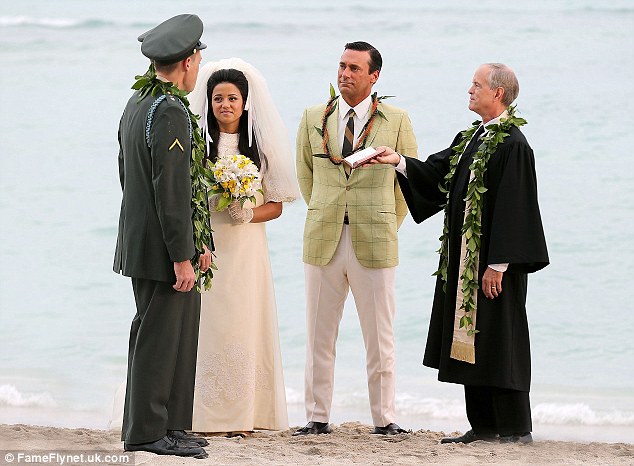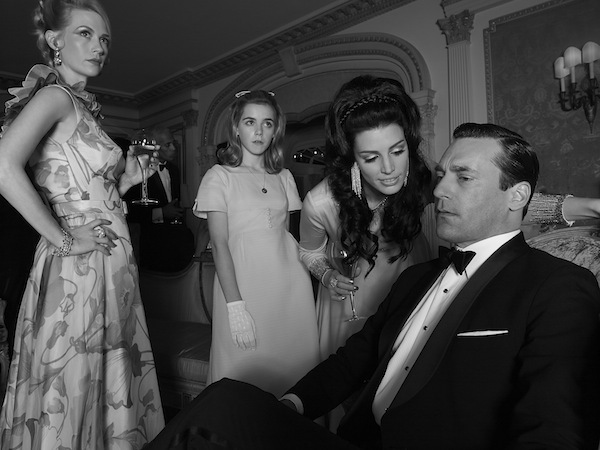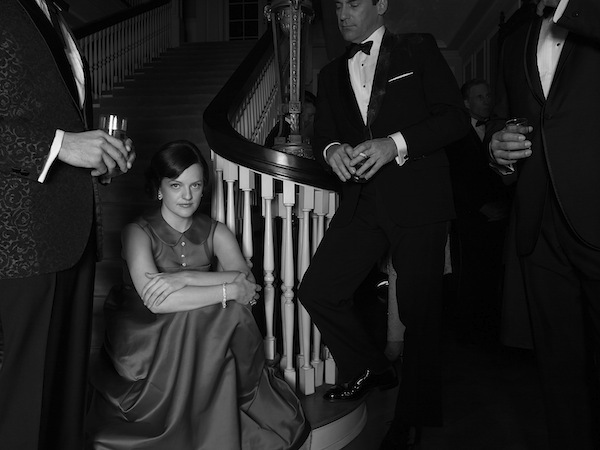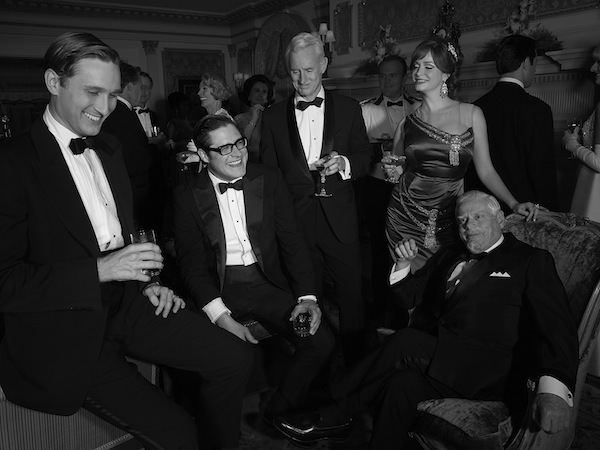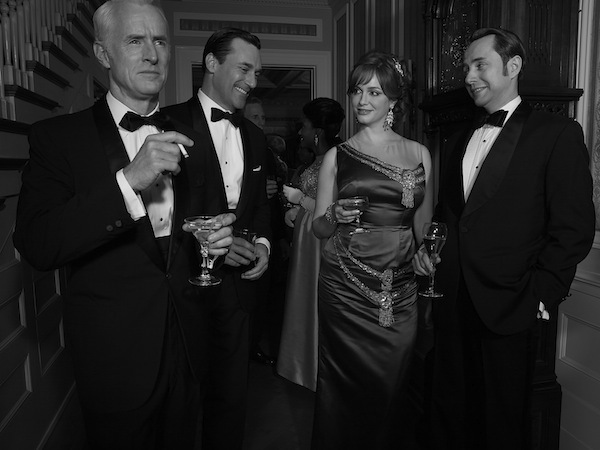Install the app
How to install the app on iOS
Follow along with the video below to see how to install our site as a web app on your home screen.
Se debe tener en cuenta: This feature may not be available in some browsers.
Estás usando un navegador obsoleto. No se pueden mostrar este u otros sitios web correctamente.
Se debe actualizar o usar un navegador alternativo.
Se debe actualizar o usar un navegador alternativo.
MAD MEN
- Autor Magnolia
- Fecha de inicio
Harry Block
Exiliado
Respuesta: MAD MEN

Tranquis, todo controlado y con prescripción médica.
No conté lo de mi muela por no parecer demasiado obsesionado. Pero la confesión de Dussander ha sido un WTF! irresistible.

Tranquis, todo controlado y con prescripción médica.

No conté lo de mi muela por no parecer demasiado obsesionado. Pero la confesión de Dussander ha sido un WTF! irresistible.
Respuesta: MAD MEN
Vincent Kartheiser acaba de confirmar que la progresiva calvicie de Pete es intencionada y que le fueron afeitando la línea de crecimiento del pelo al principio de la temporada porque Weiner lo quería.
Buen detalle.
Vincent Kartheiser acaba de confirmar que la progresiva calvicie de Pete es intencionada y que le fueron afeitando la línea de crecimiento del pelo al principio de la temporada porque Weiner lo quería.
Buen detalle.
Max Renn
Miembro habitual
- Mensajes
- 6.689
- Reacciones
- 1.563
Respuesta: MAD MEN
Weiner aprovecha una pausa de rodaje de You Are Here para extenderse sobre el significado de la temporada, las reflexiones de los fans, el episodio a tres bandas, la influencia de los 60 y la ciencia ficción en el presente de la serie o las acciones de los personajes.
Una entrevista bastante interesante y densa, si os manejáis con el inglés.
Y no, no quiere soltar prenda sobre si Peggy vuelve o no.
Fuente
Weiner aprovecha una pausa de rodaje de You Are Here para extenderse sobre el significado de la temporada, las reflexiones de los fans, el episodio a tres bandas, la influencia de los 60 y la ciencia ficción en el presente de la serie o las acciones de los personajes.
Una entrevista bastante interesante y densa, si os manejáis con el inglés.
Y no, no quiere soltar prenda sobre si Peggy vuelve o no.
Let's start with Peggy. In general on the show, when people leave the agency, they leave the show. How much did you struggle with the fact that Peggy was at a point for her character where she really needed to break away from Don, versus Peggy being a really important character to the series as a whole and how you maintain her?
Matthew Weiner: I struggle with reality, which is that their closeness was affected by Don's relationship with Megan, as we saw in "Tomorrowland." She was not competing with Megan, but he had a person in his life that was providing what (Peggy) had provided for him, once he found someone knew. And then she is working her butt off. She is family, and he uses her as an outlet for his honesty and for his unfettered emotions, and she's getting too much abuse, along with her success, that he's always seeing her that way. It's always a struggle, but the writer's room was very clear about it that there was no way she would keep working there. So that's the way to do it is to find an exit for her. As far as her being part of the show, you're going to have to wait and see how we deal with that.
Last year, when they were going for the Virginia Slims account and lost it, it occurred to me that if ever there was a person in the "Mad Men" universe who deserved to write a real-life slogan, it was Peggy with "You've come a long way, baby." She couldn't do that at Sterling Cooper Draper Pryce; now she can. I assume that thought has occurred to you as well.
Matthew Weiner: We were always interested in this early Virginia Slims thing. We loved the fact that it was a small, undesirable product for everybody, and it of course became a pretty big success. But that's such a famous campaign written by such a distinctive person that I would never do that.
You've used other people's campaigns before and credited them to Don.
Matthew Weiner: I don't think that's true, other than "It's toasted."
That was the one I had in mind. In terms of the cutthroat nature of what was going on at the agency this year, and that Peggy leaves and Lane kills himself and everyone is attacking everyone else, was any of this influenced tonally by what went on between you and the network and the studio in between last season and this one.
Matthew Weiner: No. I was really interested in the opposite. I tried to put that out of my mind. I'm an artist, and there's no doubt that going through that experience influences everything. But no. Other than the fact that I felt the growth of Sterling Cooper mirrored the growth of AMC, which is it came upon them suddenly and they may not have been prepared for it, and I thought that was an interesting story. That's not a judgment of AMC, that's just a part of inside baseball about business. I loved that they were owed so much money and had to keep putting money out to keep working, and weren't able to absorb the fact that they were so incredibly successful. And then of course, when things are going well is often the time when people turn against each other; it's just an interesting story to me. I was more interested in the traditional trappings of happiness and how it does not quell desire at all. I described Pete as pushing his shoulder against this door for all these years, and then it opens and he's Pete! Big disappointment to him. Same thing in the premiere when Roger says to Don, "They're all great girls, until they want something." And Don's girl is independent. Don is not a modern person. I don't think he ever had a perception of the fact that this woman — even though he loved her for her youth and independence, and loves her for that, and that's what we see when we see him watching that film is how much he loves her — he never perceived that she would separate herself from him. And it's the way that a person would, that she would have her own desires, her own ambitions, outside of him.
One of the ways this season distinguished itself is that there were more episodes that broke the mold stylistically and tonally from some previous ones you had done: the Richard Speck episode, the LSD episode. How was it decided that you were going to do some more formal experimentation than you had in the past?
Matthew Weiner: I don't know if that's necessarily true. Obviously, we had "723," which is told in a flashback structure. We have Don flashbacks a lot of times that go in and out of reality. "Shut the Door, Have a Seat" has parallel stories in the present and the past. What I did feel was at this point, 65 episodes into it, that we had earned the right where I don't want to do the same show every week. And how do you tell a story in the most interesting way? I loved the LSD episode of telling these three episodes simultaneously. It's a very old form. There's an old movie I love called "Le Plaisir," by Max Ophüls, based on some separate short stories by Guy de Maupassant where you follow each character and they sort overlap a little bit. We thought, "How intense would it be to have these three relationships thematically unified?" Three relationships sort of on the rocks, being defined, these people taking a journey to another place and what that means for you, yourself and your partner.
And then the Joan story, the structure of "The Other Woman," was really genius. I think Semi (Chellas) was the person who came up with it in the room. There was really no other way to tell this story, because we had a fantastic pitch for Don with Jaguar that had to be good enough to win it, but we had this guy standing in the way, and it became a huge problem of how could you ever show the pitch after we knew what Joan did and have paid any attention to it at all? So doing them simultaneously and then going back that one had happened before the other was a great way to have your cake and eat it, too.
You're now dealing with the second half of the '60s, which is the more famous, more chronicled, more familiar to a younger generation half of the decade. How, if at all, does that change the way you approached storytelling this season?
Matthew Weiner: It has a lot, actually. It's something I didn't really want to say, but you're the first person to ask me. I've always been telling a story, from the beginning of season 2, when the youth culture starts to be the focus of the advertising industry and commerce in general, and then the society. And you see Clearasil and talk about Pepsi, but there's the scene in the elevator with the guys talking and they won't take their hats off. And the crudening of our culture, it's a big part of the story. There becomes less irony, and as the manners disappear, there's less hiding. That's something that I've really tried to tell. That's why Ginsberg will swear out of the middle of nowhere, that's why more of the language becomes more on the nose. Witticisms start dropping off. It hasn't changed for Don and Roger, but I'm trying to tell a story about how we've become the way we are now. And I think that being inundated with nihilism, random violence, the rise of subversion in the marketplace — which Ginsberg represents — multi-culturalism, this is not a good or bad judgment. It's just part of how we became more modern, and what people perceive. One of my things is that human behavior doesn't change, but certainly the manners change, and what you're watching is the manners changing.
And I use it in every aspect of the storytelling. And it's a very fine gradation, and it's hard to do, but I think the audience felt that there was this kind of precipice, and Don feels it, too. It's not just about people saying exactly what they want. When Megan's going to follow her dreams, because that's what she wants to do, and Roger says, "My father told me what to do," and Don says, "I grew up in the '30s; my dream was indoor plumbing." We take it for granted that you can choose what you want to do. That's all part of a new generation, and very soon there's going to be a generation doing whatever it wants, and they're completely supported by the generation before them. In the Rolling Stones episode, when Don's backstage with that girl, she says, "You don't want us to have fun because none of you did." It's actually the opposite: a lot of parents really indulged their kids because of that very thing, because they grew up in the Depression.
It's really part of the storytelling. I'm very proud that we did our LSD episode without spinning color wheels and things like that. It was really about the "ah-ha" experience of it. There was a lot of hallucination in it, but the three story structure was the departure, not the telling of the drug trip. Betty went on a drug trip when she had her baby, and I think it was just as disturbing.
In terms of what you said before about how some of the language becomes more on the nose, some feelings become more overt, one of the discussion topics I've heard and had with people about the show this year is whether the theme of each episode and the theme of the season itself became more overt in the storytelling than it did previously. Is that something you felt or you intended as you were writing it?
Matthew Weiner: I've heard that discussion too, except for then when I hear what people say what the theme is, I'm disappointed, because it's so obvious and yet they're wrong most of the time. They say how obvious it is, and yet it's basically not what I was talking about. I'm flattered and pleased to have this unique television show that even deals with theme. If there's any attention to the audience to look at a theme, I don't think it exists anywhere else. It's one of the unique things that the show has to offer. When I look at the kind of work I try and emulate and the kind of storytelling that I like — if you look at "Moby Dick" and ask, 'What does the whale mean?" You can say, "Well, the whale means this" and end your conversation at that. But that's not what it means. There's a scene at the beginning of "Moby Dick" where he goes into a hotel and there's a painting on the wall that basically tells the entire story. So people trying to guess what's going to happen versus people trying to allow themselves to experience a meditation on an idea like jealousy or need or friendship — "Signal 30" was one where to say it's about friendship, like there's a test on the episode is a bummer for me. To say, "What does it say about friendship?" is something else.
It's tough to get a question like that, because it puts you in such a defensive position. God knows, I love the amount of criticism the show gets, because it shows people's passion for it. I don't want them to stop writing about it, or theorizing or even every season saying it's not as good as it used to be. That's fine with me, because it means that people are interested in it and watching it. But I do want people to know that if they give themselves over to each episode, there's a lot more there, and the fact that they're even looking for a theme is a lot more flattering for me. It's not usually the topic of a one-hour TV drama.
I would give you a specific example: People saying that they knew Lane was going to kill himself, in the episode, a couple of people told me that. And I said, "Wait, you mean when he got fired, and Don told him to think of an elegant exit, and he said, 'What am I going to do?'" My job is not to shock you that this is a twist in the story that Lane kills himself. It's working on a bunch of levels: Ohmigod, are they really going to get rid of this character? For me, there was a great storytelling piece there, which is that he fails and then you forget about it. But his hostile act and what that does to Don, that's the story I'm trying to tell. If you can see everything I do coming, if you can see everything coming — at the end of season 1, I heard from people who said they could tell Peggy was pregnant by the end of episode 3. And I was like, "Look, you know what? If you're that far ahead of it, then you're probably not enjoying it. I'm fine with that. Don't watch it."
There was a lot of talk of science fiction this year, with Ken's stories, with Ginsberg talking about Mars, Paul writing a "Star Trek" script, and one of Megan's friends auditions for "Dark Shadows." I'm curious why you wanted to hit science fiction so hard. And also, was it purely a coincidence that she's auditioning for "Dark Shadows" in an episode that aired the weekend the movie came out.
Matthew Weiner: That was a total coincidence. (In terms of science fiction), you have to realize that we do look at the calendar and do look at what's happening. There are certain times when I key into things. The amount of UFO sightings in New York City from 1959 to 1970 are huge. Science fiction starts in the 50s and it's always seen as a Cold War phenomenon, but it really comes into fruition and reaches the mass culture — look at "Star Trek" getting on national TV — in the mid-'60s. It's something we found that was everywhere. And it was a way for people to talk about very profound things. "The Twilight Zone," I'm obviously a huge fan. I always love seeing that interview of Rod Serling saying, "Oh, I'm just telling little stories..." And he's getting to do this incredible cultural critique every week. We're talking about a society that is subversive and, in the midst of success, sort of overwhelmed with deeper issues, like what is our purpose and can we be a better society? That's sort of what happened by the end of the '60s: a lot of ideological things come into play because the financial needs are being met. Science fiction's a part of that. It was really derived from that period. And Ken gets to tell a story about his life, or about Pete's, the genre he picks is science fiction, because – just like the rest of his life — he can hide the deeper meaning under this fantastical story. I am a huge science fiction fan, and I loved it when I started seeing it was really, really on everyone's mind. Once something gets on national television, it's everywhere. When we started the show, I thought how big all of the beatnik jokes were. Oh, this is not a small thing anymore, by 1960, the whole culture is laughing about it. When you have Maynard G. Krebs on a national TV show, then my mom and dad know what a beatnik was.
Finally, I've seen some of the other interviews you've done where you answered the Joan question, so I'm not going to rehash that. But I'm curious, given how long you've been on, how do you decide what bits of the history of the show people are just going to understand implicitly like the previous examples of Joan's pragmatism and what needs to be underlined more, like the connection between Lane's suicide and Adam Whitman's?
Matthew Weiner: I don't even think about it. We sort of live in the world where we are. I forget things. Jared Harris reminded me in the episode where they get in the fight that he had been instrumental in Pete's success, and that that should come up. He was particularly disgusted because he had basically put Pete in there against Roger. I had forgotten that. On the other hand, what a pleasure it is as a writer to be able to know that five years later, the audience knows who Adam is the minute they see him. Or that Joan can say something — and this is in one of the episodes that people find so unsubtle — is when Joan says to Greg, "You're not a good man and you never have been, and you know what I'm talking about," that the audience knows exactly what she's talking about. That was four seasons beforehand. What a pleasure to be in a complete universe like that. I try not to think about what the audience will and will not understand. One of the secrets of doing the show — and AMC has been on board with this, as has Lionsgate — is we look at each other and go, "Do we understand this?" And if we understand it, then we just assume the audience does. That's really the only rule. I never step back and go, "Oh, it's too much math. No one's going to understand a credit line." We don't even worry about it. We literally just do it, because we understand it, and that's it.
I always think about the other side of it: can you enjoy the show if you don't know what it is? I do think about that. And every one of these things has passed the test on that.
Matt, thanks for the time.
Matthew Weiner: Alan, if you really want to know what the season's about, listen to the words to "You Only Live Twice."
Fuente
Harry Block
Exiliado
Respuesta: MAD MEN

Qué intersantes siempre las entrevistas de Weiner.
Aunque, en el fondo, qué poco sorpendentes, porque es un tío tan cabal y metódico que no suele hacer más que confirmar y detallar lo que ya hace evidente la serie, que puede ser sofisticada pero nunca críptica.
Matthew Weiner: Alan, if you really want to know what the season's about, listen to the words to "You Only Live Twice."
En cuanto a la elección de "You Only Live Twice", es imposible escoger una canción mejor con una letra más adecuada para describir el leitmotiv de la temporada y casi que de toda la serie.

Qué intersantes siempre las entrevistas de Weiner.
Aunque, en el fondo, qué poco sorpendentes, porque es un tío tan cabal y metódico que no suele hacer más que confirmar y detallar lo que ya hace evidente la serie, que puede ser sofisticada pero nunca críptica.
Última edición:
Respuesta: MAD MEN
Curioso lo que dice del plan sobre la juventud y las formas. Es algo claramente presente en las últimas temporadas, pero es cierto, y no me había dado cuenta, que viene de más atrás.
Me parece curioso también que esta quinta temporada sacrifique cierta sutileza (referencias anteriores de Joan y Andy, lo comentado arriba, la presencia visible de un tema) por ser más viva y, desde luego en mi opinión, la mejor.
Y comparto con Weiner la tirria hacia los videntes.
Curioso lo que dice del plan sobre la juventud y las formas. Es algo claramente presente en las últimas temporadas, pero es cierto, y no me había dado cuenta, que viene de más atrás.
Me parece curioso también que esta quinta temporada sacrifique cierta sutileza (referencias anteriores de Joan y Andy, lo comentado arriba, la presencia visible de un tema) por ser más viva y, desde luego en mi opinión, la mejor.
Y comparto con Weiner la tirria hacia los videntes.
Harry Block
Exiliado
Respuesta: MAD MEN
Qué pena no haber descubierto su canal en vimeo al principio de la temporada para poder exprimir los episodios aún más, pero me han gustado mucho los análisis que esta pareja hace de cada uno:
The Orange Couch (vimeo) - Mad Men Season 5
Vuelven en julio para comentar la nueva temporada de Breaking Bad.
Qué pena no haber descubierto su canal en vimeo al principio de la temporada para poder exprimir los episodios aún más, pero me han gustado mucho los análisis que esta pareja hace de cada uno:
The Orange Couch (vimeo) - Mad Men Season 5
Vuelven en julio para comentar la nueva temporada de Breaking Bad.
Última edición:
Respuesta: MAD MEN
Acabada la temporada . Los últimos dos minutos del último capítulo son una obra maestra. Cumbre. Superdotada secuencia de un vigor y un talento superlativo. La mejor secuencia en años. Cuando él se aleja del set y hasta el final. Que maravilla, la leche.
Gran temporada, enorme más bien. La mejor de todas y con unos personajes brillantes.
Acabada la temporada . Los últimos dos minutos del último capítulo son una obra maestra. Cumbre. Superdotada secuencia de un vigor y un talento superlativo. La mejor secuencia en años. Cuando él se aleja del set y hasta el final. Que maravilla, la leche.
Gran temporada, enorme más bien. La mejor de todas y con unos personajes brillantes.
Respuesta: MAD MEN
El 7 de abril vuelve LA SERIE con doble capítulo, que dicen que estará concebido como película.
http://blogs.elpais.com/quinta-temporada/2013/01/mad-men-sexta-temporada.html
El 7 de abril vuelve LA SERIE con doble capítulo, que dicen que estará concebido como película.
http://blogs.elpais.com/quinta-temporada/2013/01/mad-men-sexta-temporada.html




